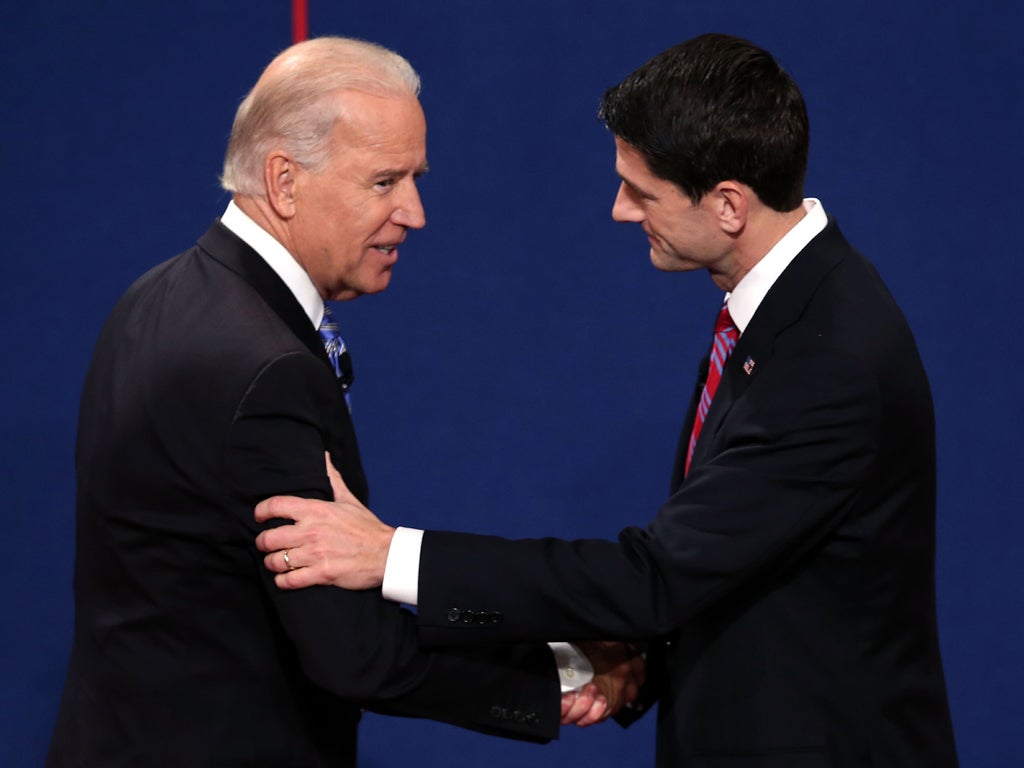Credit to moderator Martha Raddatz for ensuring Joe Biden and Paul Ryan had a substantive debate
In an election campaign blighted by hectoring and half-truths, thank goodness the vice-presidential candidates were willing to get their hands dirty

Your support helps us to tell the story
From reproductive rights to climate change to Big Tech, The Independent is on the ground when the story is developing. Whether it's investigating the financials of Elon Musk's pro-Trump PAC or producing our latest documentary, 'The A Word', which shines a light on the American women fighting for reproductive rights, we know how important it is to parse out the facts from the messaging.
At such a critical moment in US history, we need reporters on the ground. Your donation allows us to keep sending journalists to speak to both sides of the story.
The Independent is trusted by Americans across the entire political spectrum. And unlike many other quality news outlets, we choose not to lock Americans out of our reporting and analysis with paywalls. We believe quality journalism should be available to everyone, paid for by those who can afford it.
Your support makes all the difference.Thanks for moderator Martha Raddatz. She began last night’s Vice-Presidential debate with Libya, “on a rather somber note.” Some of the more resonating parts of the ensuing discussion began with foreign affairs, an area of expertise for Mrs Raddatz.
When asked to respond to Paul Ryan, who believes the President was late to define the Benghazi embassy attacks as perpetrated by terrorists, Joe Biden pointed to the intelligence community. Weeks after the event, Mr Ryan argued, the President had falsely maintained “a protest and a YouTube video” were to blame. “The intelligence community told us that,” Mr Biden responded. Themes of this argument ran throughout the debate and highlight serious issues within U.S. foreign policy. In particular, Mr Ryan's criticism of the UN and America's working relationship with it is worrying, as is the incumbent's inconsistency on withdrawing troops abroad.
When asked about the crisis in Syria, Mr Ryan's perspective is adamantly against waiting for UN approval. He was incredulous that the U.S. could stand by Vladimir Putin's veto power as Bashar al-Assad kills his own people with Russian weapons. Something should have been done sooner, Mr Ryan argued, without waiting for Kofi Annan.
On Afghanistan, Mr Biden emphasizes that the only way to make Afghan's take responsibility for their own security is to make a clear cut. He claimed there is nothing political about it; the military will be out by the end of this summer. America's allies support the widrawl deadline, he reasoned, and that is important.
Both candidates know military spending needs to change. Mr Ryan is in favor of assuring America's military dominance and paying the price. Mr Biden thinks that money can be better spent and the military agrees. The answer is both. Government's first responsibility is to protect its people, and it must do so affordably. War changes, military budgets can always be refined, but meeting new standards might cost more. International cooperation is not easy or efficient, but is increasingly important for international security.
There shouldn't be a gap between intelligence, military, and the executive; Mr President is the Commander-in-Chief. As Mrs Raddatz said last night, “the military follows orders, trust me.” This Vice-Presidential debate was a hopefully cordial affair and came as a welcome respite from the election's perpetual, nagging rhetoric. The issues addressed were important so the discussion continues.
Join our commenting forum
Join thought-provoking conversations, follow other Independent readers and see their replies
Comments